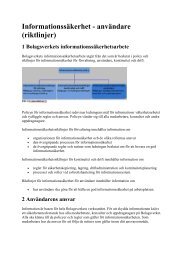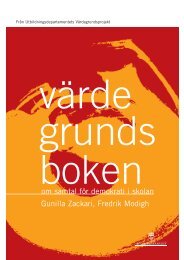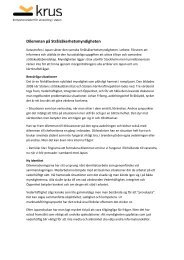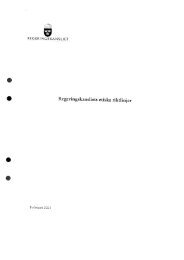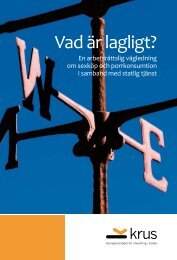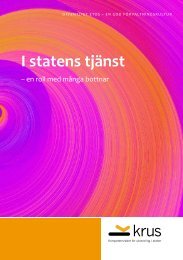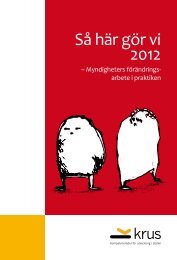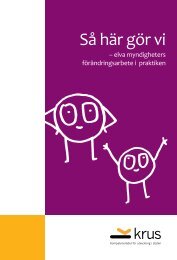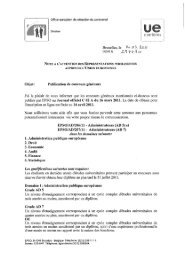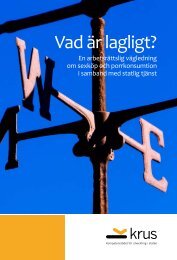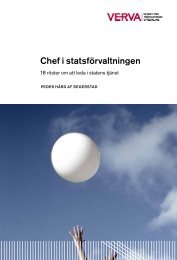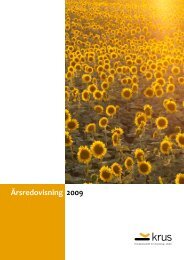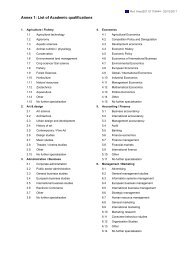Dialogkompetens i skolans vardag - Publikationer - LTU - Luleå ...
Dialogkompetens i skolans vardag - Publikationer - LTU - Luleå ...
Dialogkompetens i skolans vardag - Publikationer - LTU - Luleå ...
Create successful ePaper yourself
Turn your PDF publications into a flip-book with our unique Google optimized e-Paper software.
Relation between tools used in action research and the ZPD 565<br />
Concluding remarks<br />
As a part of the action research process, and for the purpose of supporting learning in<br />
the ZPD, different tools were tried out by the participants. During the process, the<br />
tools were gradually internalised so as to become owned by the individuals or communities<br />
of practice. None of the tools derived from a prefabricated given-ness as a tool<br />
‘to be applied’ (Altrichter, 2005). The analysis highlights differences between a<br />
passive role in the reproduction of knowledge and an active role in ZPD in which<br />
knowledge is produced. To be actors in a learning process that can lead to emancipation<br />
is also within the philosophy of action research (Carr & Kemmis, 1986).<br />
The teachers in this study had access to several communities of practice. The<br />
time afforded to sharing experiences from different school cultures and to gaining<br />
input from the university teachers was greatly valued by the participants. Time, also<br />
increased the opportunities for building relations as an important part of being a<br />
true critical friend. Since they were in practice together, the participants developed<br />
relationships of trust as users of different tools, especially as regards shadowing.<br />
Even if tools such as writing and shadowing were used separately, they were also<br />
combined in conjunction with group sessions of participants being ‘critical friends’<br />
in facilitation and during web dialogues. However, it seems to be more difficult to<br />
create an atmosphere that enables participants to be critical friends in a group. As<br />
Rönnerman (2005) explains, group discussions together with a facilitator can lead to<br />
the development of collegial knowledge or, in other terms, a shared communityrelated<br />
language. This can be extended to communicate knowledge in writing,<br />
discussions and dissemination, all of which are important for learning and school<br />
improvement.<br />
In theories about the ZPD, interaction with colleagues, in the form of carefully<br />
formulated challenges in the ZPD, is a necessity for professional development.<br />
According to Wenger’s (1998a) view of communities of practice, it is action, rather<br />
than language, that is in focus. We address the importance of having both; that is to<br />
say, being in action together (shadowing) forms an authentic base for written and<br />
verbal tools. Without similar experiences of action, there is a risk that facilitation, web<br />
dialogues and log-writing are regarded merely as mental activities as opposed to situations<br />
with a high potential for learning.<br />
A crucial element in action research processes is the need to make different efforts<br />
to enable everyone’s voice to be heard in both speech and written texts. During such<br />
processes there is a need to develop teachers’ awareness of how to contribute to practice-related<br />
dialogues and of their ability to use colleagues’ voices in the collective<br />
development of knowledge. In this study, the tools produced different voices and a<br />
question about what kinds of voices each tool can illuminate. The use of individual<br />
tools visualises a single voice, which might lead to an inner dialogue. In Bakthin’ terms<br />
this can also lead to learning, since the inner dialogue will be stimulated, even though<br />
these processes are not there to be investigated (Bakhtin, 1981; Dysthe, 2002). Tools<br />
that produce dual voices or multi-voices also involve the dependency upon other<br />
voices than one’s own. Using each other’s voices for learning is also a means of



